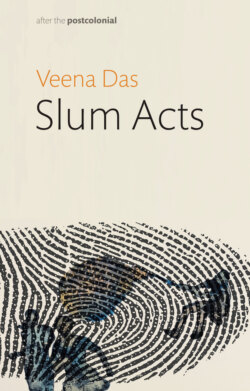Slum Acts

Реклама. ООО «ЛитРес», ИНН: 7719571260.
Оглавление
Veena Das. Slum Acts
CONTENTS
Guide
Pages
After the Postcolonial
Slum Acts
Acknowledgments
1 Introduction
Slum Actions and Definitions
Violence: Civilized vs. Savage
Sovereignty: Alternate Genealogies
Knowledge That Wounds
The Next Chapters
Notes
2 The Catastrophic Event: Enduring Inordinate Knowledge
The Event
Two Ways of Deciphering a Terror Trial
The Bombay Bomb Blasts
The Confession
The Bail Petition
Begunah Qaidi: The Innocent Prisoner
Bringing Social Theory into the Scene of the Inhuman
Yet Another Register of Knowing
Notes
3 The Dispersed Body of the Police and Fictions of the Law
Ordinary Violence and Legal Fictions
The Policing Apparatus
The Dispersed Body of the Police
Navigating Everyday Dangers
Veeran, the Irrepressible
We Want Just a Little Help
A Time for Pause
Notes
4 Detecting the Human: Under Which Skies Do We Theorize?
Extreme Violence
Shifting the Question
A Form of Life
The First Scene
A Coda on Padmaavat
Maintaining Friendships in Difficult Times
The Second Scene
The Third Scene
Notes
5 Conclusion: In Praise of the Minor
Clean Torture or Torture Without Visible Wounds
No Warrant Torture
Notes
References
Index. A
B
C
D
E
F
G
H
I
J
K
L
M
N
O
P
Q
R
S
T
U
V
W
POLITY END USER LICENSE AGREEMENT
Отрывок из книги
A series sponsored by the Smuts Memorial Fund University of Cambridge
AbdouMaliq Simone, Improvised Lives Veena Das, Slum Acts
.....
Chaganti (2020) is interested in the figure of Indra for a different reason. Working in the courts in Karnataka and following court cases inside the court and in the offices of the lawyers, she wants to capture the rogue element of sovereignty that works both inside and outside the law even as judges and lawyers are engaged in formal hearings as well as in deal making in the corridors of the courts, parliaments, or in smoky cafés. I think Chaganti is right in thinking that a rogue element characterizes the kind of sovereignty Indra embodies. Indra commits, at different times, every sin that Dumézil thinks the warrior is prone to commit and on each occasion one of his powers leaves and goes to some other God. But Chaganti’s ethnography shows that, far from succeeding in taking the warrior god and redeploying him in the service of the good religion, the rogue function gets absorbed within sovereignty.5 In my understanding the rogue element of sovereignty is what suddenly, without warning, upends the pact-making aspects that people might have put together through a tacit understanding of the pairing of force with contract.
All these components of Dumézil’s formulation on the Vedic gods as figures of thought on sovereignty serve very well to complicate sovereignty beyond the notion of the sovereign having the right to declare the exception, but what if we were to take the gaps and puzzles that remain if we were to delve deeper into the relation between the Vedic gods and the resonances with the stories of the Mahabharata on which Dumézil drew famously to formulate his theory of the tripartite division of functions?6 Nicholas Allen (1999) has argued for a functional equivalence between Indra and Arjun (in the Mahabharata) since both stand for the warrior function, but one could very well argue that it is Krishna who is the real agent of the war and is recognized as such by Gandhari, the mother of the Kaurava brothers, when she curses Krishna for having enabled the war to happen in which all her sons perish?7 Second, and from my point of view, an even greater difficulty arises when we consider the goddess figures (particularly war goddesses, or goddesses of fire) in the Indo-Aryan pantheon. Dumézil was inclined to think of the trivalent heroine or the goddess as coming either from the second, warrior function, or from the third function of fertility and prosperity. However, given the difficulties of assigning gender to some Indo-Aryan figures of divinity and the propensity of goddesses to disguise themselves with male names, it would seem that the relation between sovereignty and sexuality needs considerable work if alternate genealogies of sovereignty are to be developed further.8
.....